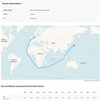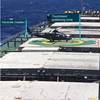Southampton Container Terminals, United Kingdom, Port Qasim, Pakistan (both managed by DP World) and Puerto Cortez, Honduras will become the first seaports to implement the Secure Freight Initiative (SFI) beginning October 12 by scanning all maritime containers destined for the U.S. for nuclear or other radiological materials. These ports fulfill the requirements set out in the Security and Accountability For Every (SAFE) Port Act of 2006, which establishes a program that couples Non-Intrusive Inspection (NII) and radiation detection technology. Data from these systems is then provided to U.S. officials at U.S. Customs and Border Protection’s National Targeting Center for analysis.
"As fellow members of the global trade community, preventing a nuclear weapon or dirty bomb attack has to be one of our highest priorities. This initiative advances a comprehensive strategy to secure the global supply chain and substantially limits the potential for terrorist threats," said Jayson P. Ahern, Deputy Commissioner, U.S. Customs and Border Protection.
"Trade and cooperation on security issues are important aspects of the special relationship that exists between the United Kingdom and the United States.
In 2006 alone, the total volume of trade between our countries surpassed $165 billion. The United States appreciates the British Government’s participation in the Secure Freight Initiative pilot program. We believe this pilot program is an important step toward a trade model that secures the global supply chain without negatively impacting port and shipping operations," said Ambassador Robert H. Tuttle.
Four additional ports are also scheduled to become operational for Phase I of the project and will provide scanning on a limited capacity basis: Singapore’s Brani terminal; Busan, Korea’s Gamman terminal; Hong Kong’s Modern Terminal and Salalah, Oman. DHS and the Department of Energy’s National Nuclear Security Administration (NNSA) partnered with these ports because they pose different challenges and provide diverse environments in which to evaluate various options.
Subscribe for
Maritime Reporter E-News
Maritime Reporter E-News is the maritime industry's largest circulation and most authoritative ENews Service, delivered to your Email five times per week










